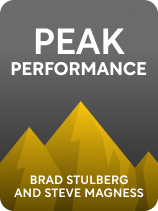
What are the best Peak Performance quotes? How does the combination of stress and rest enhance optimal performance?
In Peak Performance, human performance experts Brad Stulberg and Steve Magness highlight optimal strategies for subjecting your body to stress and recuperating afterward. By doing so, you’re refreshing your body so you can perform at your best when something important comes up.
Below we’ve listed a few of the best Peak Performance quotes that represent the authors’ main ideas.
Peak Performance Quotes
In virtually every domain—be it corporate jobs, athletic pursuits, or even college admissions—top performers are pushing the boundaries of human possibilities. But this relentless quest for excellence often leaves us suffering from chronic exhaustion and burnout, harming our performance and even our health. In Peak Performance, Brad Stulberg and Steve Magness attempt to remedy this situation. They argue that sustainable elite performance is possible by implementing cycles of stress and rest.
Take a look at these Peak Performance quotes that highlight the book’s ideas on the benefits of stress and rest, and how purpose encourages motivation.
“Stress + rest = growth. This equation holds true regardless of what it is that you are trying to grow.”
According to Stulberg and Magness, growth in any domain—mental, physical, or emotional—follows from a uniform formula. This formula holds that alternating between periods of stress and periods of rest yields consistent growth. To show as much, they examine the training of elite athletes and elite creatives to illustrate that it conforms to this formula.
It’s helpful to clarify what Stulberg and Magness mean by stress and rest in the first place. They explain that:
- Stress is a type of stimulus that challenges the body or mind by pushing it near its limits. For example, to accustom their body to marathon pace, a marathon runner might run a series of one-mile intervals at race pace with only small breaks in between.
- Rest is a period of relative inactivity that gives the body or mind time to recuperate from the stressor. In the previous example, the marathon runner might take the next day off, or only go for an easy run, to allow their body time to recover.
Stulberg and Magness point out that this cycle of stress and rest is ubiquitous among elite endurance athletes, according to research comparing the training patterns of elite athletes in various endurance sports, such as swimming, running, cycling, and cross-country skiing. This research found that, instead of continuously performing high-octane exercises every day, these athletes repeatedly alternated between periods of intense exercise and periods of recovery.
But Stulberg and Magness also note that this pattern isn’t limited to athletes. On the contrary, they cite research from Hungarian psychologist Mihaly Csikszentmihalyi (Flow) showing that creative intellectuals embrace this same approach. Csikszentmihalyi interviewed the top intellectuals in various disciplines and found that they largely used the same strategy that athletes use when training: They were either focusing wholeheartedly on their research or taking time away from it to recuperate.
Stulberg and Magness point out that though it’s unsurprising that rest is crucial for physical performance, the importance of rest is unexpected for intellectual endeavors. They explain that the mind needs rest because, like our muscles, its performance diminishes after stress. In defense of this claim, they point to several experiments that tested participants’ problem-solving skills after forcing half of them to participate in a mentally strenuous activity (like resisting the temptation of a nearby cookie or solving a tough puzzle). These experiments revealed that participants who had performed the strenuous activities consistently performed worse on problem-solving tasks than the other participants.
In addition to helping our minds recuperate, Stulberg and Magness point out that rest fosters creative insights by activating the brain’s default mode network. The default mode network, they explain, was discovered by a psychiatrist who found that his patients’ brains remained extremely active (according to brain scans) even when they weren’t doing any concrete tasks. In other words, our subconscious mind is activated even when we aren’t consciously thinking, and Stulberg and Magness contend that this pattern generates creative insights out of the blue. For this reason, we disproportionately come up with new ideas while resting instead of actively working.
“In a society that glorifies grinding, short-term gains and pushing to extremes, it takes guts to rest.”
Although it’s tempting to think of rest as something passive, Stulberg and Magness argue that we should take active steps to rest effectively by practicing mindfulness, prioritizing sleep, and taking short walks.
Mindfulness meditation, Stulberg and Magness explain, is a Buddhist form of meditation that involves focusing solely on one’s breathing. By practicing mindfulness when resting, practitioners become better at coping with stress. To show as much, Stulberg and Magness point to studies demonstrating that mindfulness meditation is associated with increased activation in the prefrontal cortex, the part of our brain that controls our stress response. Other studies have found that experienced mindfulness practitioners respond better to pain and discomfort than novices—according to brain scans, experienced practitioners are able to switch off the emotional response to pain in their amygdalas, while novices cannot.
According to Stulberg and Magness, sleep is another crucial form of rest for intellectuals and athletes alike. Stulberg and Magness relate that numerous studies have shown that sleep helps us consolidate information—in other words, it reinforces the information that we know and forges connections between new pieces of information. However, they point out that sleep’s key benefits are derived from rapid eye movement (REM) sleep, which largely occurs between hours seven and nine of sleep. Consequently, intellectuals need copious amounts of sleep to reap its full benefits.
Stulberg and Magness also note that, for athletes, sleep is crucial for activating the anabolic state—a state in which hormones like testosterone and human growth hormone flood our bodies and help repair our muscles and bones. These hormones are released during REM sleep, meaning sleep-deprived athletes can enjoy outsized physical benefits simply by sleeping a couple hours longer to spend more time in REM sleep.
Stulberg and Magness argue that taking short walks is an underappreciated form of rest. They note research showing that these walks can spark creative ideas. The researchers separated workers into three groups—one that didn’t go on a walk, one that went on a six-minute walk outdoors, and one that went on a six-minute walk indoors—and had everyone take the same creativity test. Those who walked outdoors and those who walked indoors scored 60% and 40% higher than those who didn’t walk at all, respectively.
“Purpose fosters motivation; motivation lets us endure a greater perception of effort; and enduring a greater perception of effort often results in better performance. This equation holds true in every field—from the track to the workplace.”
The authors contend that having a purpose that goes beyond our own interests is essential to maximizing performance, because such purposes help us overcome our perceived psychological limitations.
For context, Stulberg and Magness explain that physical fatigue lies not only in our bodies, but also in our minds. To show as much, they cite an experiment that asked weightlifters to perform leg exercises until physical exhaustion—the point at which they could no longer lift. Researchers then ran an electric current through their legs and found that their leg muscles could still contract, suggesting they weren’t truly depleted, even though the weightlifters believed they were.
Because fatigue lies partially in our minds, it stands to reason that if we could shift our perception of fatigue during stress, we could increase our performance. And, Stulberg and Magness report, one study suggests we can do just that. In this study, researchers scanned the brains of participants who were exposed to threats, asking one group to think about their core values beforehand. Those who thought about their values displayed brain activity showing that they perceived the threats positively. In other words, reflecting on their values allowed them to shift the brain’s perception of threats.
For this reason, Stulberg and Magness note that individuals with stronger senses of purpose performed better at their jobs. For example, one study of hospital janitors found that janitors who believed their job was crucial for helping patients heal performed better and were more satisfied than those who lacked this sense of purpose. Further, in a separate meta-analysis of over 200,000 employees, scientists found a significant positive association between increased job performance and employees’ belief that their job positively impacted others.

———End of Preview———
Like what you just read? Read the rest of the world's best book summary and analysis of Brad Stulberg and Steve Magness's "Peak Performance" at Shortform.
Here's what you'll find in our full Peak Performance summary:
- That the quest for excellence leaves us suffering from exhaustion and burnout
- Why cycles of stress and rest are necessary for sustainable elite performance
- How to develop a consistent routine and structure your time






